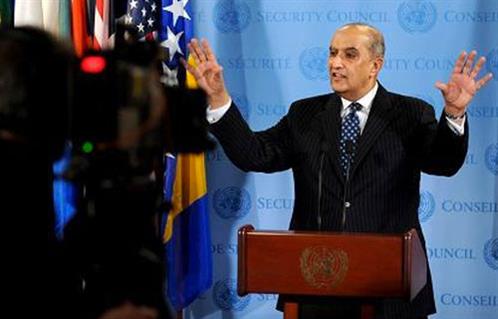
“The Arab World today remains a region blessed with a plethora of unharnessed opportunities and enormous economic potential” - stated confidently in his opening remarks Ambassador Maged Abdelfattah Abdelaziz, Permanent Observer for the League of Arab States at the United Nations. On October 31, 2018, Ambassador addressed the audience gathered in the Yale University’s MacMillan Center as part of the Global Governance speaker series, discussing developments in the region and its changing role on the international stage.
Ambassador Abdelaziz deplored that the ongoing conflicts in the Arab region, according to the UN, resulted in a net loss of over $614 billion USD in economic activity in the region. He was adamant that “while those challenges (armed conflict, extremism, political instability) may at the moment seem insurmountable, they do not accurately represent the Arab World,” pointing to the region’s economic, demographic, and cultural potential and stressing its preparedness for the future. While there exists a stark disparity between wealthy, oil-rich Gulf states, and their neighbors in turmoil, the region is forecasted to note a 3.1 % growth this year, headed towards emerging technologies and “anchored by the innovation of its people.”
As someone who has been immersed in the work of the United Nations for over 20 years, first as advisor to Egypt’s president Hosni Mubarak, then leading UN Secretariat work on Africa, and now representing the League of Arab States (LAS), Ambassador Abdelaziz had invaluable experiences to share from his work in national, regional, and international levels of governance. He stressed the importance of expanding the cooperation between the UN and regional organizations such as the LAS, especially with regards to the local implementation of Sustainable Development Goals.
Abdelaziz spoke at length about the backstage of the Middle East Peace Process, which, in words of Prof. Yuriy Sergeyev who moderated the talk, continues to be the “catalyst issue” in the region. Egypt has historically played a unique role in Israeli-Palestinian negotiations, and was in fact briefly suspended from the League of Arab States in 1979 after signing a peace treaty with Israel, an act which an Arab coalition led by Iraq, Libya and Syria saw as treason. That treaty included a provision for an independent Palestine, which, had it been signed by the Palestinian leadership in 1978, would have ended the conflict decades ago. More recently, Egypt together with Jordan (the only Arab states to date to formally recognize Israel), facilitated the continuation of negotiations after a stalemate reached in 2000 at Camp David over the contentious issue of Jerusalem. Currently the American side is working on a new peace agreement package, however the Palestinian leadership, antagonized by the U.S. administration’s decision to move the embassy to Jerusalem and it’s cut to funding the UNRWA—UN agency providing humanitarian aid to Palestinian refugees—is hesitant to engage in the process.
In his remarks, Ambassador also addressed the urgency of the UN Security Council reform. “The balance of power in the UNSC reflects the post-WW2 reality”, he said, adding that a better representation, e.g. through dedicating one of the permanent seats to an Arab country, is a vital next step. He expressed deep concern that the current structure of the body prevents the development of comprehensive and timely solutions to conflicts in the Arab region. “A new Cold War is brewing,” Abdelaziz warned, and pointed to the cases of the war in Syria, and Israel-Palestine, both subject to numerous vetoes by U.S. and Russia over their course. In his view, the disagreements among the permanent Members “leave Arab states vulnerable,” and only prolong the ongoing humanitarian crises in the region.
Ambassador also noted with concern the slow progress on devising a global counterterrorism effort. “In 1981 Mubarak stood before the European Parliament in Strasbourg, calling for an international conference on terrorism. Can you believe it has been nearly 40 years and it still has not come to fruition?” Attempts to draft a comprehensive agreement to replace the 13 existing ones led to a stalemate over the definition of terrorism, and despite the Global Counter-Terrorism Strategy existing since 2005, there is a “lack of unified position and regional structures to address the rise of violent extremism” in the Arab region, despite commitment demonstrated at the UN level.
The audience actively engaged with the Ambassador during a Q&A session, challenging him on topics such as Saudi involvement in Yemen, human rights, the budgetary and political constraints facing the LAS, and insufficient pressure to bring ongoing conflicts, most notably the war in Syria, to an end.
In words of Ambassador Abdelaziz, “the Arab world is undoubtedly an integral component and exponentially important player” of the changing world order, and Arab states are looking for international partnerships based on “equality and mutual interests to achieve our goals,” not handouts. However, “extraordinary commitment and sustained engagement” will be required on the part of the international community to help restore the battered region, so it can reach its full potential.
Written by Weronika Betta, B.A. student in Political Science, Yale University

